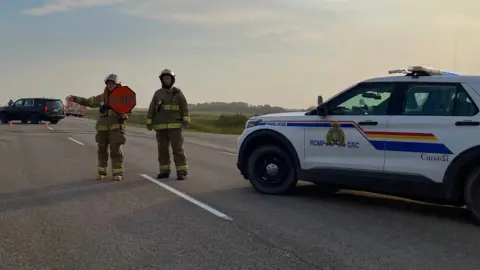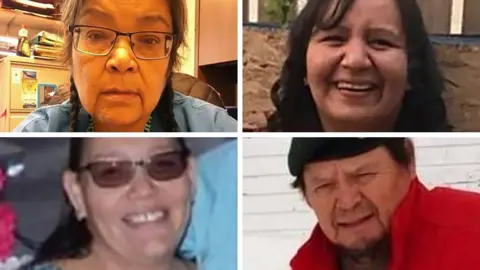Saskatchewan mass stabbings: Suspect violent in days before attack
 BBC
BBCTwo brothers spent days drinking, dealing drugs and stealing cars before one of them killed 11 people in the Canadian province of Saskatchewan last September, police said.
On Thursday, police shared new details about the deadly stabbing spree that stunned a small indigenous community.
The spree ended with the capture of suspect Myles Sanderson after a days-long manhunt.
His brother, Damien, was the first victim to be killed.
Myles died in police custody shortly after he was captured. There was no evidence anyone else was involved in the murders, police said.
The stabbing spree, which unfolded in the early hours of 4 September, took place on the James Smith Cree Nation and in the nearby small community of Weldon.
Ten people were killed in the indigenous community, including Sanderson's brother Damien. One person was killed in Weldon, a nearby farming town of about 200 people.
Seventeen people were injured in the attacks.
Some seven months after the murders, victims and family members were briefed by police on a detailed timeline that covers both the attacks and the days leading up to them.
Police said they combed through 42 different crime scenes and interviewed more than 250 witnesses in connection with the investigation.
But authorities said they would not reveal any further information about Sanderson's parole status, the police response to the attacks, or his cause of death, until inquests scheduled for next year.
Parole documents show Sanderson has 59 prior convictions and was released in February 2022 while serving a four-year sentence.
Saskatoon police had been searching for him since May, when he stopped meeting with his assigned caseworker and was classified as "unlawfully at large" at the time of the rampage.
Drinking and stealing vehicles
Saskatchewan Royal Canadian Mounted Police (RCMP) say Myles Sanderson, 32, and Damien, 31, drove around selling drugs and getting involved in a series of assaults and altercations in the days leading up to the killings on 4 September 2022.
They stole vehicles and visited bars around the James Smith Cree Nation. In the period before the rampage, Damien told a woman at a bar the brothers had "a mission to do" and "people will hear about it".
On 3 September, police responded to reports of Damien Sanderson stealing a car. They recovered the vehicle and encountered Damien in a house, but he gave them a false name and was not arrested by the officers.
In the early hours of 4 September, witnesses told police they saw the brothers "guzzling booze" and seeming to be getting ready for something.
Police said the attacks began in the early morning hours, just before 05:00 local time, shortly after the pair stole a Dodge Caravan. The two entered a home and Myles Sanderson attacked a man with scissors and stole a knife.
RCMP superintendent Joshua Graham, head of the major crimes division, said police rushed to the house after receiving an emergency call.
 Reuters / Sask First Nations Veterans Association
Reuters / Sask First Nations Veterans AssociationPolice said they believe the brothers got into an argument shortly after that first incident, and Myles killed Damien. Myles then went to another home, where he killed Robert Sanderson, his second victim.
Over the next few hours, Myles Sanderson travelled both by foot and stolen vehicles around the community, breaking into a series of homes.
In one, he killed Gregory Burns and attacked his mother Bonnie Burns. He later returned to that residence and killed Bonnie Burns, along with Gloria Burns, a former first responder who had arrived on the scene to help.
His other victims in James Smith Cree Nation were Thomas Burns, Carol Burns, Earl Burns, Lana Head, and Christian Head.
After an hours-long series of attacks, Myles Sanderson then drove to nearby Weldon, where he killed Wesley Petterson, the oldest of the victims at age 78.
A frantic manhunt came to an end on 7 September. Sanderson died shortly after his dramatic arrest on a provincial motorway following a high-speed chase.
It remains unclear how he died, though Canadian media have widely reported it was from a suspected overdose.
Police did not give any details on the cause of death on Thursday, instead saying it would be addressed by the provincial coroner, who is holding two inquests early next year into the stabbings as well as Myles Sanderson's death.
